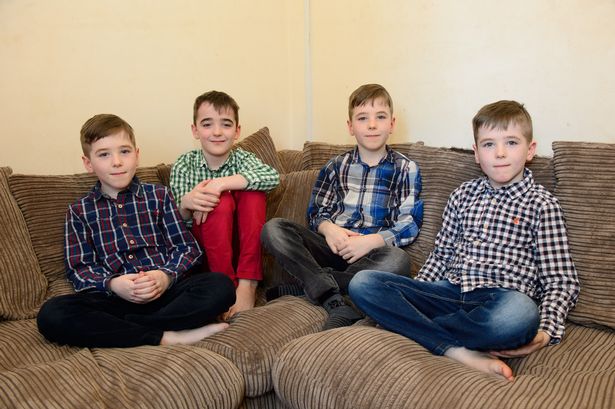[ad_1]
As a dad of quadruplets, and five children in all, home schooling, lockdown and all the other new aspects to our lives caused by the pandemic have been a challenge for Martin Robbins.
“I am separated from their mum so we share the time looking after them. Very recently they’ve been lucky enough to be classed as vulnerable so they are now allowed to go to school because we can’t possibly work and home school five kids and likewise for their mum,” he said.
“But it was only a recent thing. Otherwise, we have been battling to juggle homeschooling them and working at the same time. That’s been the hardest part of it for them I think because we’re parents rather than teachers who they’re afraid of, it has been tough at times.”
But while it has been hard for the adults, at least we have more skills and life experience in our arsenal to deal with the challenges of the pandemic, and to process it.
For children and young people, it can be quite different.
They have had to cope with being without their friends and some family members, separation from sporting and other social activities, homeschooling, the loss of close relatives and family friends to coronavirus, and the new fear that it’s not just strangers they need to be wary of, but invisible bugs that could be anywhere and hurt them or their parents or grandparents.
When Children’s Commissioner for Wales, Professor Sally Holland, released the findings of her second survey into how young people are faring during the crisis, she warned that the pandemic was having a “crushing impact” on under 18s.
In the survey, named Coronavirus and Me, children shared their views and experiences of the pandemic. Though responses varied, a “worrying” number of youngsters described the devastating impact the last 12 months had had on their lives.
One 10-year-old from mid Wales said: “I hate this pandemic, and I hate locking down. I want to train football with my friends, go for walks with my family and gather with friends and have fun. Boring”
While a 16-year-old from south Wales said: “I feel depressed about being stuck at home. I really want the school to open as soon as possible to see my friends and teachers. I realise now how important going to school is after not being able to go to school because of the coronavirus”.
You can now get all of the need-to-know news sent straight to your inbox by signing up for our free WalesOnline newsletter.
It takes just seconds to subscribe – simply click here, enter your email address and follow the instructions.
The report found that as well as loneliness, not being able to see friends was having the biggest impact on children’s lives, followed by not being able to see other family members and school and college closures.
On learning remotely, more than half of 12 to 18-year-olds said they enjoyed learning at their own pace from home, but many worried about falling behind with learning.
A worrying 15% of seven to 11-year-olds reported feeling lonely “most of the time”.
Father-of-five Martin Robbins said he felt very fortunate that loneliness hadn’t impacted on his nine-year-old quadruplets – Zac, Sam, Josh and Reuben – and their older brother Luke. However, he said certain aspects of the lockdown had been challenging for his sons.
“The fact there are so many of them means I don’t think they’re losing out so much on the social aspects as I’m sure a lot of individual kids are,” said Mr Robbins who lives in Chepstow. “So in that regard, I think they’re quite fortunate.”
Re home schooling, he said: “Four of them are learning the same thing so you only have to go through it once, but everyone learns at different stages. It was a lot and sometimes I feel their attention span was impacted being at home. It’s not like being sat in a classroom, they found it a struggle being at home because it was hard to separate in their heads between school and home.
“Now the eldest goes to school five times a week while the quads alternate – one week two of them go in for a full week while the other two go in for half a week and then they swap the following week.”
(L-R) Zac, Sam, Josh and Reuben Robbins
(Image: Mark Lewis)
All the children together
(Image: Martin Robbins)
Mr Robbins said he felt his children were fortunate to live in a rural area, meaning they had the opportunity to go outside and get regular fresh air, but that they missed parts of their usual pre-covid routine.
He said: “They used to go to after-school clubs and things like that, and they really did miss out on stuff like that. They did a combination of arts and crafts stuff and outdoor stuff with other kids, but luckily we’re sporty as a family and mountain bike a lot so that’s been good.”
Someone who knows all about the importance of the outdoors and clubs for children is Gareth Thomas, who coaches juniors at Ystradgynlais Rugby and Football Club.
He said the club offered children the chance to play rugby for free, meaning in normal times it was a release for all the children involved, no matter what their socioeconomic background was. Most recently, training ceased at the start of the current lockdown, meaning those children who rely on it for their mental and physical well-being are really missing it, as well as those who purely enjoy playing the sport.
Read More
Related Articles
Read More
Related Articles
“The club committee supports the children to play for no cost and is working very hard behind the scenes so that everyone can come back as soon as possible as we recognise how important it is,” he said.
“About 200 children train with is. They are as young as four all the way up to our under 16s teams. That includes training once a week and then playing games on a Sunday. We have various social events throughout the year and some teams also go on tour. It provides a great mental, physical and emotional release for children to play sport for a rugby club as well as an opportunity to make friends for life.
“We’ve been able to train between the various lockdowns and we’ve also carried on engaging parents and children through different challenges and online events.
“But speaking to parents now, we’re hearing that a lot of children need to come back – as long as it is safe to do so of course. We’re working with the Rugby Union to make sure we can deliver a safe environment so we can start back again as soon as possible, but we don’t have a specific date yet.”
Ystradgynlais Rugby Club juniors
(Image: Ystradgynlais RFC)
He said a year was a long time for these children to not be able to consistently play sport with each other and that they were all missing it a lot.
“They change quickly physically and mentally. We’ve done out best to encourage them to get out and get walking and riding their bikes in the fresh air. When we were allowed to start back safely training our junior and mini teams after the first lockdown, we had our highest numbers yet, so it really showed how much the boys and girls had missed it and how beneficial sports clubs are.
“Children need to reconnect with their friends and with the outdoors and we’re missing them as much as they’re missing us.”
Dr Catherine Foster is a research associate at the Wales Institute of Social and Economic Research and Data (WISERD). She works mainly studying young people exploring their perspectives on their education.
During the pandemic, she said life had “changed dramatically” for many young people who suffered the effects of things like loneliness and loss of routine.
She said: “While some children have been able to continue attending school at least some of the time, most have lost the routine and structure school attendance creates for young people. Our [multi-cohort] survey from last summer showed that over 90% of secondary school pupils surveyed were missing their friends, almost half missing their teachers and 70% of year 10 were worried about not being able to catch up with schoolwork when they returned.”
Find out about coronavirus cases in your area:
Dr Foster noted that the Coronavirus and Me survey conducted by the Children’s Commissioner showed that almost a third of young people surveyed had felt lonely “most of the time” during the pandemic and almost a quarter felt sad most of the time.
“While we don’t have a direct comparison with pre-pandemic times, this is worrying and there are likely many causes,” she said. “When asked what changes due to Covid-19 had had the biggest impact on them, not being able to spend time with friends, not being able to visit family members and schools closing were the three most common answers given.
“However, one positive is that just over half of children reported spending more time playing since the pandemic began, although this may depend heavily on the young person’s home environment.”
Though she said some pupils would have experienced an improvement in their mental health over the course of the pandemic – maybe because they found home less stressful than school – the majority of the data suggested that, for the most part, the pandemic had resulted in a “very negative mental health impact” on under 18s.
Generally the worst affected children, she said, were those who came from disadvantaged backgrounds.
Dr. Catherine Foster, a research associate in WISERD Education. Cardiff University
(Image: David Evans Berry)
She explained: “There were already educational inequalities in Wales, and school closures will have had the biggest impact on both the welfare and educational progress of more disadvantaged young people. While the Welsh Government has continued to provide free school meals and along with schools worked to provide digital learning resources to families who needed them, not all children have a home learning environment suitable for their needs, and this cannot be solved by tackling digital exclusion alone.
“Analysis of the Children’s Worlds study in Wales, led by Dr Jennifer Hampton (WISERD) revealed that only 44% of children experiencing higher levels of deprivation had a place to study at home, compared to 86% of children not experiencing material deprivation.
“Children are less likely to do homework or study outside of school if they have higher levels of material deprivation, almost a third report doing no homework or study outside school.
“The bottom line is that children with a quiet home learning environment, a range of digital learning resources and caregivers who have the time and ability to support their learning will be far less disadvantaged by the coronavirus pandemic.”
[ad_2]
Source link



